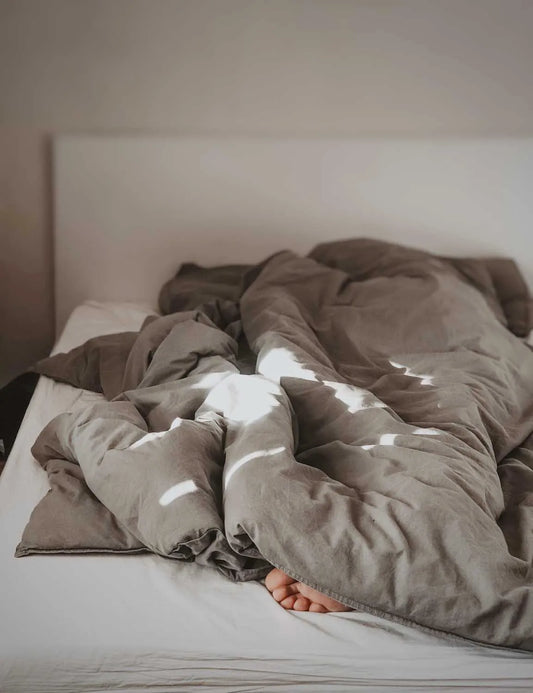Dive into the intriguing topic of light sleep as we explore its significance and impact on overall well-being. At Remly Sleep, we're dedicated to leveraging research for product development, and The Dream Lab is our way of sharing the knowledge we gain with you.
Do you ever wake up feeling like you've been sleeping lightly all night, without fully sinking into a deep slumber? While light sleep might not feel as refreshing as deeper stages, it's still a crucial part of our overall sleep cycle. In this article, we'll explore the importance of light sleep, its role in our well-being, and how you can work towards optimizing this sleep stage for a better night's rest.
What is Light Sleep?
Light sleep is one of the five stages of the sleep cycle, which also includes deep sleep, REM sleep, and the transitional stage between wakefulness and sleep. During light sleep, your body and brain activity start to slow down, your muscles relax, and your body temperature decreases. It is during this stage that your body prepares for deeper sleep stages. Light sleep typically accounts for about 50% of your total sleep time.
Why Light Sleep Matters
Light sleep is crucial for several reasons:
-
Memory consolidation: Light sleep plays a role in the consolidation of memories and learning. During this stage, your brain processes and stores information from your waking hours. A study published in Nature Neuroscience found that even short periods of light sleep can improve memory formation.
-
Restoration: Even though light sleep isn't as restorative as deep sleep, it still helps your body recover from daily activities and supports overall health. Light sleep is essential for maintaining proper immune function, which helps protect your body from illness and infection.
-
Sleep cycle progression: Light sleep serves as a transition between wakefulness and deeper sleep stages, ensuring a smooth and natural sleep cycle. Having a balanced mix of all sleep stages contributes to better overall sleep quality and well-being.
How to Get More Light Sleep
Improving the quality and quantity of light sleep can have a positive impact on your overall well-being. Here are some practical tips:
-
Establish a sleep schedule: Try to go to bed and wake up at the same time every day, even on weekends, to regulate your body's internal clock. A study from the Journal of Clinical Sleep Medicine shows that maintaining a consistent sleep schedule can improve sleep quality and duration.
-
Ensure your bedroom is cool, quiet, and dark. Consider using blackout curtains, white noise machines, and comfortable bedding to enhance your sleep experience. For more tips on creating an optimal sleep environment, check out our article on creating a dreamy bedroom.
-
Limit screen time before bed: Exposure to blue light from screens can interfere with your sleep. Reduce screen time at least an hour before bedtime and consider using blue light blocking glasses. Research suggests that limiting blue light exposure before bedtime can improve sleep quality.
-
Exercise regularly: Regular physical activity can improve sleep quality. A study found that regular exercise can improve sleep quality and help reduce sleep disturbances.
- Manage stress: Practice relaxation techniques such as deep breathing, meditation, or yoga to reduce stress and improve sleep quality.
- Watch your diet: What you eat and drink can also affect your sleep. Limit caffeine and alcohol intake, especially close to bedtime. According to a study in the Journal of Clinical Sleep Medicine, consuming caffeine even six hours before bedtime can disrupt sleep. Opt for a light, balanced meal in the evening, and consider incorporating sleep-promoting foods like almonds, bananas, and cherries into your diet.
- Develop a bedtime routine: Creating a calming bedtime routine can signal your body that it's time to sleep. Engage in relaxing activities such as reading, taking a warm bath, or practicing mindfulness meditation.
How Age Affects Light Sleep
As we age, our sleep patterns change, which can impact the amount of light sleep we get. Older adults may experience a decrease in deep sleep and an increase in light sleep. This can result in more frequent nighttime awakenings and a feeling of unrest upon waking. By implementing the tips mentioned above, you can work towards optimizing your light sleep, regardless of your age.
Light Sleep and Napping
Napping can be a great way to recharge during the day, but it's essential to understand how napping affects your light sleep. Short naps of 20-30 minutes can be beneficial, as they typically consist of light sleep and can help improve alertness and cognitive function. However, longer naps can interfere with your nighttime sleep, making it more difficult to fall asleep or maintain a healthy sleep cycle. If you find that napping negatively impacts your nighttime sleep, consider adjusting the duration or frequency of your naps.
Tracking Your Light Sleep
Tracking your sleep can provide valuable insights into your sleep patterns and help you identify areas for improvement. Many sleep tracking devices and apps on the market can monitor your sleep stages, including light sleep. By tracking your light sleep, you can assess your sleep quality and make necessary adjustments to your sleep habits and environment to optimize your sleep experience.
Concluding Thoughts
Light sleep is a crucial aspect of our overall sleep cycle, playing a significant role in memory consolidation, restoration, and sleep cycle progression. By understanding its importance and implementing practical tips such as establishing a consistent sleep schedule, creating a sleep-friendly environment, limiting screen time before bed, exercising regularly, managing stress, watching your diet, and developing a bedtime routine, you can work towards optimizing your light sleep and enhancing your overall well-being. As you continue to prioritize your sleep health, you'll be better equipped to face the challenges of daily life and enjoy a higher quality of life.
Remember, achieving optimal sleep is an ongoing process, and every individual's sleep needs are unique. Be patient with yourself as you make adjustments to your sleep habits, and don't hesitate to seek professional help if you suspect you have a sleep disorder or need further guidance on improving your sleep quality.
Thank you for exploring with us at The Dream Lab. Remly Sleep is on a mission to make you sleep better by sharing the latest sleep research and incorporating this knowledge into our innovative products. We're excited to journey together and discover more insights on sleep and well-being.




